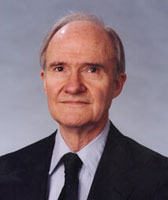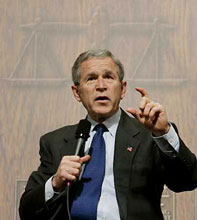|
Scenarios for US Pullout From Iraq: Report
 |
|
The US hopes the Iraqi elections might give it a chance to see the way out of Iraq. (Reuters)
|
CAIRO,
January 10 (IslamOnline.net) – How the US might ever start pulling
out its troops from Iraq is a question occupying the Pentagon,
Congress and even the White House, with suggestions ranging form
pressing the Europeans to fill in the expected vacuum to hopes that
the coming controversial general elections might stabilize the
situation, a major US daily reported on Monday, January 10.
“Three
weeks before the election in Iraq, conversation has started bubbling
up in Congress, in the Pentagon and some days even in the White House
about when and how American forces might begin to disengage in
Iraq,” The New York Times said.
The
report cited the coming Iraqi elections, pressures on the Bush
administration to set a timeline for withdrawing troops from Iraq, in
addition to the increasingly high costs as long as the roughly 150,000
US troops remain in Iraq, as the main drives behind the talk of an
exit policy.
“The
rumblings about disengagement have grown distinctly louder as members
of Congress return from their districts after the winter recess, and
as military officers try to game out how Sunni Arabs and Shiites might
react to the election results.
“The
annual drafting of the budget is a reminder that the American presence
in Iraq is costing nearly $4.5 billion a month and putting huge
strains on the military. And White House officials contemplate the
political costs of a second term possibly dominated by a nightly
accounting of continuing casualties,” wrote the mass-circulation
daily.
Controversial
Polls

|
|
Scowcroft believed the vote “has great potential for deepening the conflict.” |
The
New York Times said that all over Washington, there is talk about new
ways to define when the mission is accomplished - not to cut and run,
but not to linger, either.
“Several
administration officials acknowledge that Mr. Bush will face crucial
decisions soon after Jan. 30, when it should become clearer whether
the election has resulted in more stability or more insurgency.”
Former
US national security adviser, Brent Scowcroft, on Thursday, January 7,
predicted the Iraqi election would not be a promising transformation.
He
said the vote “has great potential for deepening the conflict,”
cautioning Washington “may be seeing incipient civil war at this
time,” according to the daily.
Scowcroft,
as per the daily, went even further by saying the situation in Iraq
raised the fundamental question of “whether we [US] get out now.”
He
suggested Bush should address the issue with the Europeans during his
upcoming trip to Europe.
“In
short, he was suggesting that Mr. Bush raise the specter that Iraq
could collapse without a major foreign presence - exactly the
rationale the administration has used for its current policy,” added
The New York Times.
However,
on Friday Bush kept up his rosy visions about Iraq, dismissing
Scowcroft's concerns about a the civil war and believing the exact
opposite.
“I
think elections will be such an incredibly hopeful experience for the
Iraqi people,” Bush said.
His
optimism is, however, in sharp contrast, some administration insiders
told The New York Times, to some conversations in the White House
Situation Room, the Pentagon and Congress.
“For
the first time, there are questions about whether it is politically
possible to wait until the Iraqi forces are adequately trained before
pressure to start bringing back American troops becomes overwhelming.
“Some
Senators are now openly declaring that Iraqi military and police units
are not up to the job.”
Pullout
Timeline

|
|
“I think elections will be such an incredibly hopeful experience for the Iraqi people,” Bush said. (Reuters) |
Washington
vehemently opposes the mere idea of declaring a timeline for troops'
withdrawal.
The
Association of Muslim Scholars, the highest Sunni religious authority
in Iraq, held talks Saturday with an 11-member high-level US
delegation and offered to call off an election boycott in return
for a US timetable for troop withdrawal.
The
AMS pressed for a boycott of the vote, citing the impossibility of
organizing fair elections held under current deteriorating conditions.
According
to The New York Times, the exit strategy is so far mostly talk, not
planning.
“The
only thing resembling a formal map to the exit door is a series of
Pentagon contingency plans for events after the Jan. 30 elections.
“But
a senior administration official warned over the weekend against
reading too much into that, saying Pentagon has plans for
everything,” said the daily.
“Bush
still intended to stick to his plan, refining his strategy of training
Iraqis to take over security duties from Americans, but not wavering
from his promise to stay until the job is done.
“We
are not in the business of trying to float timetables,” The New York
Times quoted a senior administration official as saying.
“The
only metric we have is when we can turn more and more over to local
forces.”
But
the daily cited Defense Secretary Donald H. Rumsfeld's decision last
week to send a retired four-star general, Gary E. Luck, to Iraq to
assess military operations and Iraqi security forces, as a significant
evidence the issue of setting up a concrete plan of leaving Iraq was
being contemplated.
“It
was driven, administration officials say, by an urgent need to
determine what has gone wrong with the training of Iraqi troops.”
The
paper then recalled that by last fall, the Pentagon had drafted
contingency plans to begin reducing the American presence in Iraq as
early as July 2005.
“But
senior military officers say no one's picking a date now, and that any
withdrawal depends on what happens after the elections, the security
situation in Iraq, and the ability of Iraqi forces to secure the
country.”
The
New York Times even highlighted what observers believe to be a very
unlikely possibility.
“One
possibility quietly discussed inside the administration is whether the
new Iraqi government might ask the United States forces to begin to
leave - what one senior State Department official calls ‘the
Philippine option,’ a reference to when the Philippines asked
American forces to pull out a decade ago.”
Observers
believe holding the elections under the current situation, marred by
chaos, insecurity and boycotts, is sure to play into the hands of the
Bush administration, yielding results beyond the possibility of posing
any unpredictable outcomes.
|